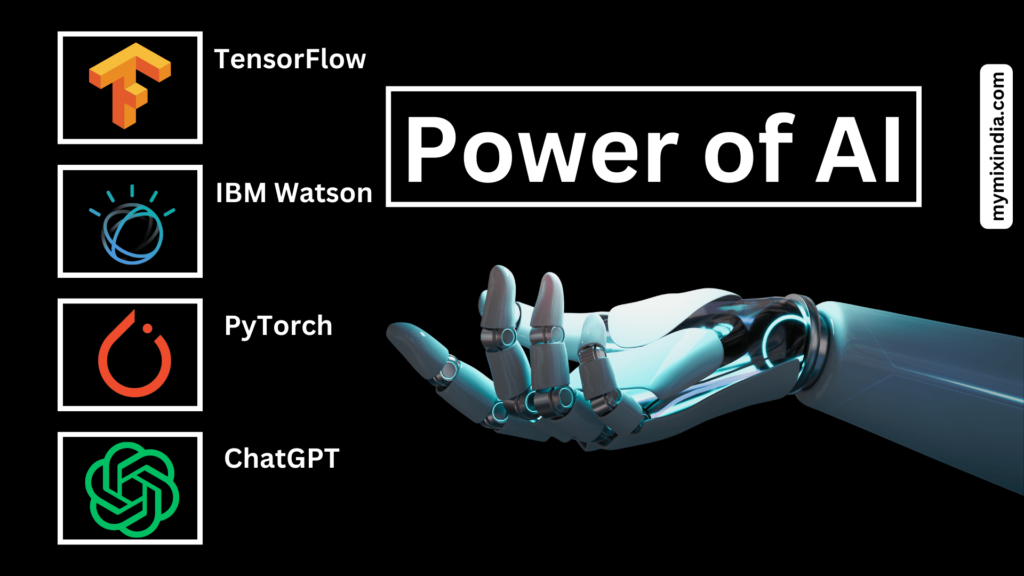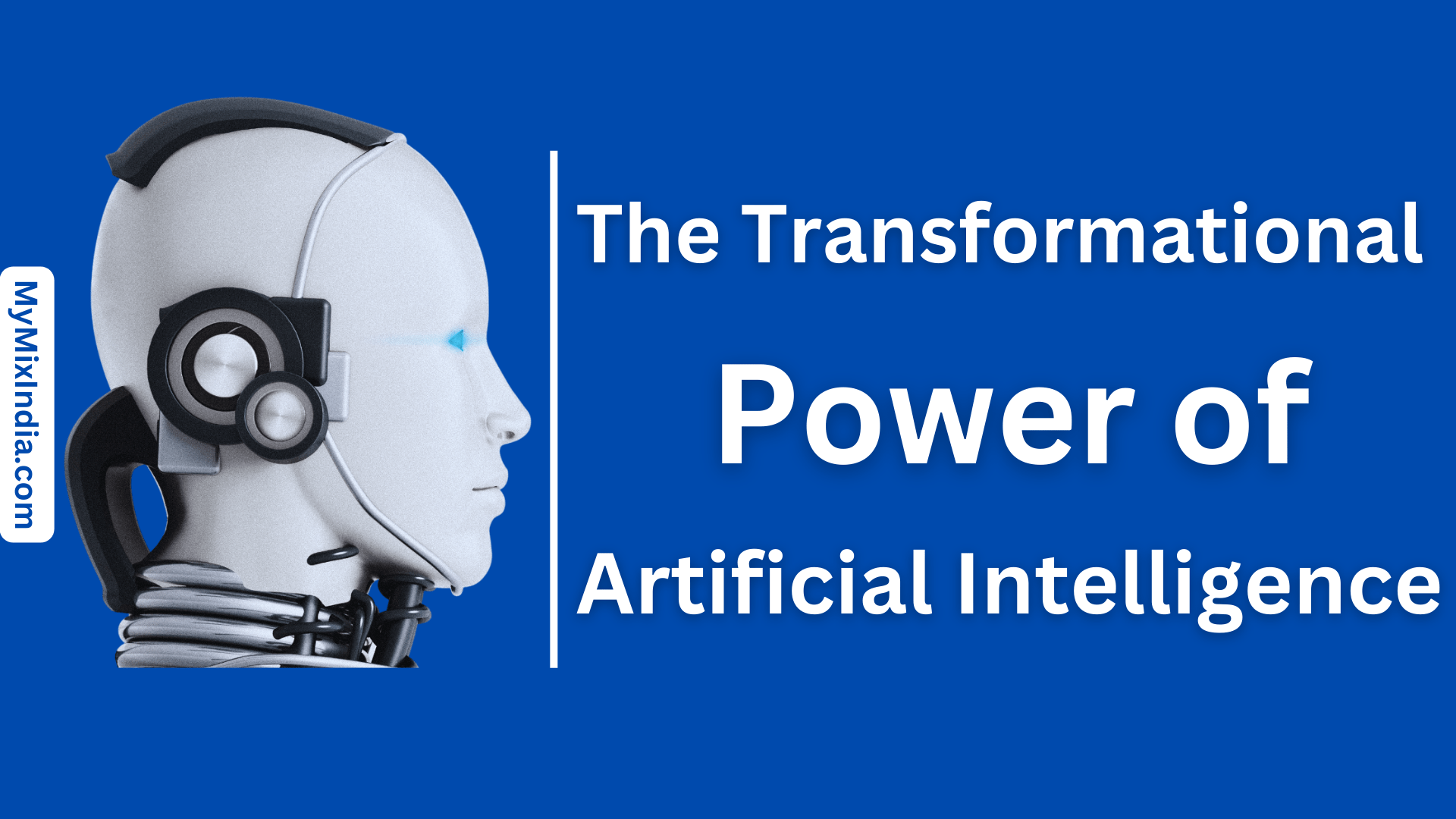The Transformational Power of Artificial Intelligence: How AI is Changing the World
Hello Everyone!
Today’s Topic is – The Transformational Power of Artificial Intelligence: How AI is Changing the World
Introduction:
Artificial Intelligence (AI) has emerged as a transformative technology, revolutionizing various aspects of our lives and industries. From enhancing business operations to advancing healthcare, AI is reshaping the world we live in. In this blog post, we will explore the profound impact of AI across different sectors and discuss how it is changing the world as we know it.
1. Advancing Healthcare:
AI is revolutionizing the healthcare industry by improving diagnosis, treatment, and patient care. Machine learning algorithms can analyze vast amounts of medical data, aiding in the early detection of diseases and the development of personalized treatment plans. AI-powered systems can assist doctors in medical imaging analysis, identify patterns in genomic data, and provide real-time patient monitoring.
2. Transforming Transportation:
AI is driving innovation in transportation, paving the way for autonomous vehicles and efficient traffic management systems. Self-driving cars equipped with AI technology can enhance road safety, reduce traffic congestion, and improve fuel efficiency. AI-powered algorithms enable intelligent route planning and optimize logistics operations, leading to cost savings and improved delivery times.
3. Revolutionizing Customer Service:
AI-powered chatbots and virtual assistants are transforming customer service experiences. Natural Language Processing (NLP) and Machine Learning (ML) algorithms enable chatbots to understand and respond to customer queries, providing instant support and personalized recommendations. AI algorithms can analyze customer behavior and preferences, enabling businesses to deliver tailored services and enhance customer satisfaction.
4. Enhancing Financial Services:
AI is reshaping the financial services industry by automating processes, detecting fraud, and improving risk management. AI algorithms can analyze vast amounts of financial data, identify anomalies, and detect fraudulent activities in real-time. AI-powered chatbots assist customers in banking transactions, while robo-advisors provide personalized investment recommendations based on individual goals and risk profiles.
5. Empowering Education:
AI is revolutionizing the education sector by personalizing learning experiences and enabling adaptive learning platforms. Intelligent tutoring systems use AI algorithms to analyze student performance, identify learning gaps, and provide tailored educational content. AI-powered virtual reality (VR) and augmented reality (AR) technologies enhance immersive learning experiences, making education more engaging and interactive.
6. Advancing Manufacturing and Automation:
AI and robotics are transforming manufacturing processes, improving efficiency, and reducing costs. AI-powered robots can automate repetitive and dangerous tasks, leading to increased productivity and worker safety. Machine learning algorithms enable predictive maintenance, optimizing equipment performance and reducing downtime. AI-powered quality control systems can detect defects and anomalies in real-time, ensuring high-quality production.
7. Revolutionizing Agriculture:
AI is revolutionizing the agriculture industry, enabling precision farming and improving crop yields. AI-powered systems can analyze soil data, weather patterns, and satellite imagery to optimize irrigation, fertilization, and pest control. Drones equipped with AI technology can monitor crops, detect diseases, and perform targeted interventions, enhancing overall agricultural productivity.
Conclusion:
Artificial Intelligence has emerged as a transformative technology, with its impact spanning across various sectors. From healthcare to transportation, customer service to education, AI is reshaping the world we live in. As AI continues to advance, it brings forth new possibilities, improving efficiency, personalization, and decision-making across industries. Embracing AI technology will enable us to unlock its full potential and navigate a future where AI-powered solutions become an integral part of our everyday lives.
Also check – Top 10 Giants of India Based on Their Revenue and Market Share
Unleashing the Power of Artificial Intelligence: Famous AI Tools and Software in the Market
Introduction:
Artificial Intelligence (AI) has gained immense popularity and significance in recent years, revolutionizing industries and transforming the way businesses operate. To harness the potential of AI, organizations rely on powerful tools and software that enable them to leverage AI capabilities effectively. In this blog post, we will explore some of the famous AI tools and software available in the market and discuss their key features and applications.

1. TensorFlow:
Developed by Google, TensorFlow is one of the most widely adopted open-source AI frameworks. It provides a comprehensive platform for building and deploying machine learning models across various domains. TensorFlow’s versatile architecture supports deep learning algorithms, making it suitable for tasks such as image and speech recognition, natural language processing, and recommendation systems. Its robust ecosystem and extensive community support make it a go-to choice for AI researchers and developers.
2. PyTorch:
PyTorch is another popular open-source deep learning framework widely used in the AI community. Developed by Facebook’s AI Research lab, PyTorch offers a dynamic computational graph that enables flexible and intuitive model building. Its Pythonic syntax and easy-to-use APIs make it popular among researchers and developers. PyTorch’s strong community support and seamless integration with popular libraries make it suitable for a wide range of AI applications.
3. Scikit-learn:
Scikit-learn is a widely used Python library for machine learning. It provides a rich set of tools for data preprocessing, model training, and evaluation. Scikit-learn supports a variety of machine learning algorithms and is known for its user-friendly and consistent API. With its extensive documentation and vast collection of functionalities, Scikit-learn is an excellent choice for both beginners and experienced practitioners.
4. Microsoft Azure Machine Learning:
Azure Machine Learning is a cloud-based platform that simplifies the development and deployment of AI models. It offers a range of tools and services for data preparation, model training, and deployment, making it suitable for both data scientists and developers. Azure Machine Learning provides pre-built AI models, automated machine learning capabilities, and integration with popular development environments, enabling efficient AI development and deployment workflows.
5. IBM Watson:
IBM Watson is a renowned AI platform that provides a range of services and tools for building AI-powered applications. It offers natural language processing, computer vision, speech recognition, and other AI capabilities. Watson Studio, part of the IBM Watson ecosystem, provides a collaborative environment for data scientists to develop, train, and deploy AI models. With its extensive capabilities and enterprise-grade solutions, IBM Watson empowers businesses to leverage AI for enhanced decision-making and customer experiences.
6. H2O.ai:
H2O.ai is an open-source AI platform that provides a comprehensive set of tools for data analysis and model building. It offers automatic machine learning capabilities, making it suitable for users with varying levels of expertise. H2O.ai’s AutoML functionality simplifies the process of building AI models by automatically selecting and tuning the best algorithms for a given dataset. Its user-friendly interface and scalable architecture make it a popular choice among data scientists and business users.
7. OpenAI GPT-3:
OpenAI GPT-3 (Generative Pre-trained Transformer 3) is a state-of-the-art language processing model that has gained significant attention in the AI community. It can generate human-like text, perform language translation, and answer questions based on context. GPT-3’s impressive capabilities make it a powerful tool for various applications, including content generation, chatbots, virtual assistants, and language-based tasks.
Conclusion:
The AI landscape is enriched with a plethora of powerful tools and software that enable organizations to leverage AI capabilities effectively. From frameworks like TensorFlow and PyTorch to platforms like Microsoft Azure Machine Learning and IBM Watson, these tools provide the foundation for building intelligent applications across domains. As AI continues to advance, these famous tools and software will continue to evolve, empowering businesses to unlock new possibilities and drive innovation in the era of artificial intelligence.
